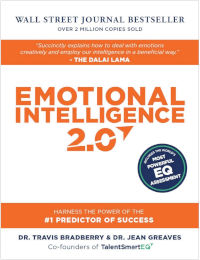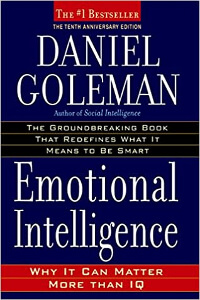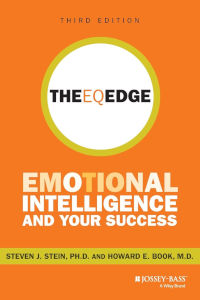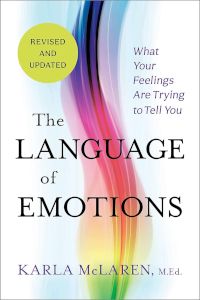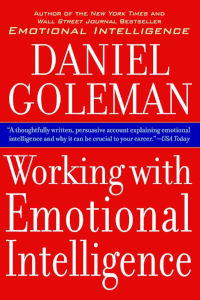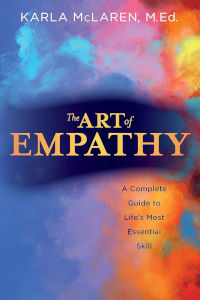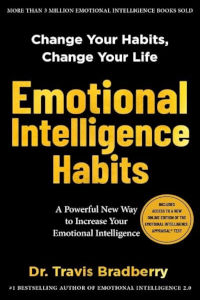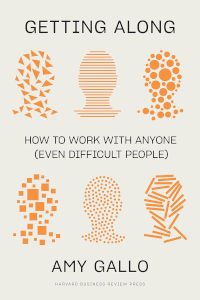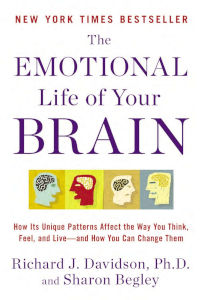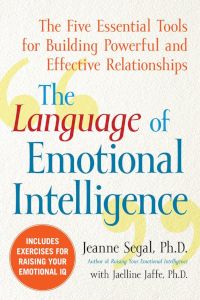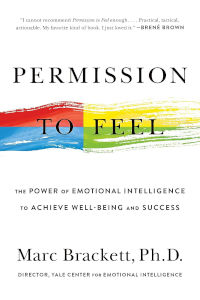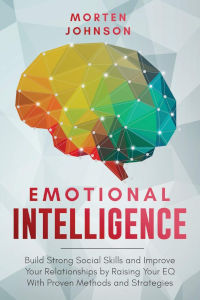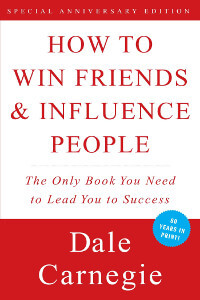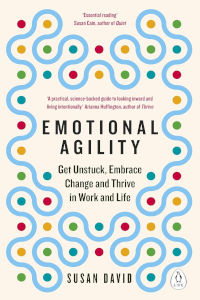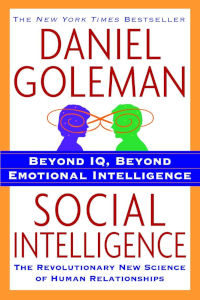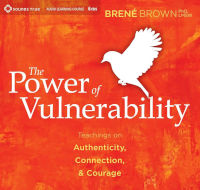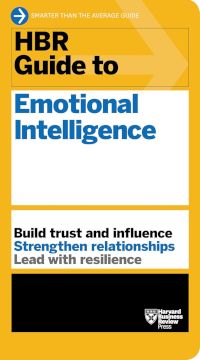Reading the best books on emotional intelligence (EQ) can help you better understand yourself and improve your relationships.
At least, it was helpful to me.
While you may understand the role of emotional intelligence in personal and professional success, you may struggle to turn this concept into action.
That’s why I’ve created this list of the best books on EQ.
The selected books provide a wide range of perspectives on the topic. Not only will they increase your understanding of the concept; but they’ll also provide actionable insights to develop your emotional skills.
Let’s dive into the selection of the best books about emotional intelligence.
P.S. check out my review of Audible if you prefer to listen to the best emotional intelligence books.
#1: Emotional Intelligence 2.0
Book summary: Emotional Intelligence 2.0 is a game-changer in understanding and improving your EQ. This book breaks the complex topic down into four key emotional skills: self-awareness, self-management, social awareness, and relationship management. It’s also packed with practical strategies and engaging exercises to boost your EQ.
Who’s this book for: The book’s easy-to-follow guidance is perfect if you’re new to the topic. Whether you’re a leader, an ambitious professional, or just someone keen on self-improvement, this book has valuable insights for you.
About the author: Travis Bradberry is an author known for his ability to translate research into practical advice. He’s also the co-founder of a consultancy that helps improve human performance.
Get your copy#2: Emotional Intelligence: Why It Can Matter More Than IQ
Book summary: Emotional Intelligence was the groundbreaking work that transformed our understanding of this topic. Goleman introduces the concept of emotional intelligence (EQ) and makes the case that it’s as important, if not more, than traditional cognitive intelligence (IQ) in determining success. You’ll learn about its 5 components and gain insights to improve your emotional intelligence skills.
Who’s this book for: It’s a must-read if you’re interested in learning why EQ became such an important career skill. It’s a particularly good read for educators, leaders, and people who want to dive deep into this topic.
About the author: Daniel Goleman is a psychologist and science journalist known for popularizing the term ’emotional intelligence.’ His work has been featured in prestigious publications like the Harvard Business Review.
Get your copy#3: The EQ Edge
Book summary: The EQ Edge delves into the practical aspects of emotional intelligence, offering an actionable roadmap to improve your EQ skills. The book provides insights into self-awareness, empathy, stress tolerance, and more. It’s packed with real-life examples, showing how emotional intelligence plays a crucial role in various scenarios.
Who’s this book for: This book highlights the link between high emotional intelligence and success, making it a perfect read for (aspiring) leaders and anyone interested in achieving personal excellence.
About the authors: Steven Stein is a clinical psychologist and CEO of a psychological test publishing company. Howard Book is an associate professor in the Department of Psychiatry at the University of Toronto.
Get your copy#4: The Language of Emotions
Book summary: The Language of Emotions is a deep dive into the world of emotions and how they guide your life. This book offers a new approach to emotions, treating them as a language for self-awareness and healing. It also provides practical advice on understanding and managing a wide range of emotions, from anger and fear to joy and sadness.
Who’s this book for: Look no further if you want to better understand your emotional world and learn how to manage your feelings. This book helps you to create a deeper connection with yourself and others.
About the author: Karla McLaren is an award-winning author, social science researcher, and empathy pioneer. She’s respected for her innovative approach to the intersection of emotions and psychology.
Get your copy#5: Working with Emotional Intelligence
Book summary: Working with Emotional Intelligence applies the principles of EQ to the workplace. In this book, you’ll explore the practical aspects of how self-awareness, self-regulation, motivation, empathy, and social skills impact your career success. And you’ll gain actionable strategies to boost EQ in your professional life.
Who’s this book for: Are you seeking to excel in your career? This book is a valuable resource to improve workplace relationships and develop leadership skills. It’s especially useful if you want to become an emotionally intelligent manager, leader, or team member.
About the author: We already mentioned Daniel Goleman on this list of the best emotional intelligence books. His insights shaped modern ideas on emotional intelligence, making him a leading figure in the field.
Get your copy#6: The Art of Empathy
Book summary: The Art of Empathy delves into the world of, you guessed it, empathy. This book provides a comprehensive guide for understanding and developing empathy. You’ll learn how to create healthy emotional boundaries, navigate emotional overload, and engage in more empathic communication.
Who’s this book for: It’s a valuable resource if you’re looking to deepen your emotional connections, whether that’s in personal relationships, professional environments, or even in your daily social interactions.
About the author: It’s Karla McLaren’s second time on this list of the best emotional intelligence books. But for good reason: Her blend of scientific research with actionable ideas is easy to read and can transform the way you communicate.
Get your copy#7: Emotional Intelligence Habits
Book summary: Emotional Intelligence Habits focuses on building daily habits to improve your EQ. The book provides many practical strategies and exercises to improve your self-awareness and social skills. Using the tools in this book helps you build consistent practices that will lead to higher levels of emotional intelligence.
Who’s this book for: Are you looking for consistent emotional growth? This book is perfect for integrating EQ practices into your daily routines.
About the author: We already mentioned Travis Bradberry for the first book in this list. As an author, he’s known for his engaging style and ability to turn research and data into actionable advice.
Get your copy#8: Getting Along: How to Work with Anyone (Even Difficult People)
Book summary: Getting Along is a practical guide to mastering your relationships at work, especially with your most challenging colleagues. The book offers tips for navigating complex social situations, building positive relationships, and managing different personalities. It also emphasizes EQ as a powerful tool to help you understand and influence others positively.
Who’s this book for: It’s the best book about emotional intelligence if you struggle with people at work and seek effective ways to collaborate with them.
About the author: Amy Gallo has a wealth of experience in organizational psychology and workplace dynamics. In her book, she offers insights and perspectives from both research and real-world experience.
Get your copy#9: The Emotional Life of Your Brain
Book summary: The Emotional Life of Your Brain explores the connection between neuroscience and its impact on your own emotions. This book reveals how your brain triggers certain emotional states. And you’ll learn how you can reshape your mind to improve your emotional and mental health.
Who’s this book for: It’s a fascinating read if you want to learn how your brain processes emotions and how you can leverage it for personal growth and mental wellness.
About the authors: Richard Davidson is a neuroscientist known for his groundbreaking research in the field of neuropsychology. Sharon Begley is a science journalist and brings these complex concepts to us in a way that we can understand.
Get your copy#10: The Language of Emotional Intelligence
Book summary: The Language of Emotional Intelligence delves into the nuances of EQ, specifically related to understanding and communicating your emotions. This book offers advice to develop emotional intelligence skills like self-awareness and self-regulation. It also provides strategies to empower you to effectively communicate how you really feel.
Who’s this book for: This book is a great read if you want to improve your emotional awareness, understanding, and communication.
About the author: Jeanne Segal is a psychologist and sociologist with a lot of expertise in emotional intelligence. She combines academic research with practical experience to offer the most effective strategies to increase EQ.
Get your copy#11: Permission to feel
Book summary: Permission to Feel advocates emotional empowerment. The book emphasizes the role that emotions play in your well-being and in the progress of society as a whole. You’ll learn how to understand and manage emotions in yourself and your children. It’s also a valuable resource if you want to learn how to nurture emotional intelligence from a young age.
Who’s this book for: This book is an essential read for (future) parents, educators, and anyone interested in the emotional development of children and its long-term impact on society.
About the author: Marc Brackett is a renowned researcher in the field of emotional intelligence, with a focus on the application of EQ principles in education and child development.
Get your copy#12: Emotional intelligence
Book summary: Emotional Intelligence offers a fresh perspective on EQ in the context of achieving personal and professional success. It emphasizes the role of self-awareness and social skills in navigating your life’s challenges. By combining theoretical insights with practical methods, you gain a holistic perspective to improve key emotional skills.
Who’s this book for: This book is another great read to gain practical ideas to increase emotional intelligence to achieve more success.
About the author: Morten Johnson is an expert in psychology, specializing in emotional intelligence and its impact on personal growth and development.
Get your copy#13: How to Win Friends and Influence People
Book summary: A timeless classic, How to Win Friends and Influence People teaches the art of effective communication and relationship-building. The book focuses on core principles like understanding others, being likable, and positively influencing people. While not directly a book about emotional intelligence, its lessons are closely aligned with its principles. And it’s one of my favorite books of all time.
Who’s this book for: If you’re looking for the most actionable strategies to improve your social interactions, get a copy of this book today.
About the author: Dale Carnegie was a pioneer in personal development and interpersonal skills. His book sold over 30 million copies. Although it was written in 1936, its timeless principles are still – if not more – useful today.
Get your copy#14: Emotional Agility: Get Unstuck, Embrace Change, and Thrive in Work and Life
Book summary: Emotional Agility offers a transformative approach to dealing with challenges in your life. The book combines psychological research with practical tips to use your emotions to navigate difficult situations. You’ll gain tools to build emotional self-awareness, flexibility, and resilience to thrive in ever-changing environments.
Who’s this book for: Struggling to keep up with an ever-evolving world? This book is the perfect choice to cope with personal and professional changes.
About the author: Susan David is a psychologist and lecturer at Harvard Medical School. She has been recognized for her research on emotional agility and its application in real life.
Get your copy#15: Social Intelligence
Book summary: Social Intelligence explores the science of relationships and the role of emotional intelligence in social interactions. The book delves into the neuroscience behind social connections. And you’ll learn how to develop skills like social awareness and social understanding to build better relationships and unlock workplace success.
Who’s this book for: Do you want to understand emotional intelligence in a broader social context? Then you’ll love this book. It’s especially useful to become a better conversationalist and build stronger relationships.
About the author: As a real pioneer in this space, Daniel Goleman secures his third spot on this list of the best books about emotional intelligence. Read more about him in list items two and five.
Get your copy#16: The Power of Vulnerability
Book summary: The Power of Vulnerability shines a light on how embracing vulnerability can lead to stronger connections, creativity, and a more authentic life. The book covers the courage to be vulnerable and how it impacts your relationships and self-perception.
Who’s this book for: It’s an empowering read if you want to embrace your true self, confront your fears through vulnerability, and build more meaningful relationships.
About the author: Brené Brown is a research professor and bestselling author known for her work on vulnerability, courage, empathy, and leadership.
Get your copy#17: HBR guide to emotional intelligence
Book summary: HBR Guide to Emotional Intelligence is a collection of articles from the Harvard Business Review. This collection provides insights into understanding and applying EQ in the workplace. You’ll gain insights from various experts in the space, covering all aspects of emotional intelligence.
Who’s this book for: This guide is a valuable resource if you’re interested in applying emotional intelligence principles to improve your leadership skills and achieve organizational success.
About the author: This guide contains a mix of expert authors in the field who contributed to the Harvard Business Review, including many on this list.
Get your copyWhat’s next?
Mastering emotional intelligence (EQ) is a journey that can transform how you see and understand yourself and interact with others. Each book offers insights and actionable tips to deal with your emotions, build stronger interpersonal relationships, and achieve greater success in life.
Remember: EQ is as important – if not more – as IQ for success. And I can vouch for that as an introvert with naturally greater levels of IQ than EQ.
More resources to learn about yourself:
- Best guided journals to make EQ a daily practice
- Best personality tests to learn about your unique traits
- Best books about self-awareness and self-understanding
Take action: Pick the emotional intelligence book that most resonates with you. Read 15 minutes every day, note down practical ideas, and immediately put what you learn into practice.
Do you want more personal growth tips and strategies to create a life you love? Sign up below to get my best stuff straight into your inbox, including unique freebies you won’t get anywhere else!

